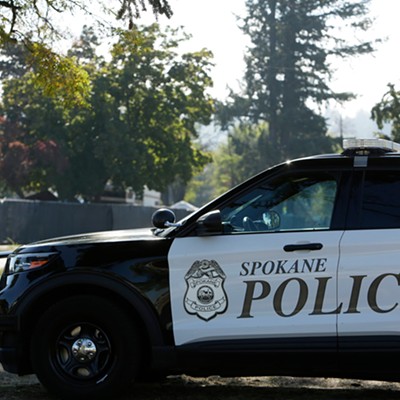Quotes & amp;amp; Notes
[
{
"name": "Broadstreet - Instory",
"insertPoint": "5",
"component": "25846487",
"requiredCountToDisplay": "5"
},{
"name": "Broadstreet - Instory",
"insertPoint": "10",
"component": "25846487",
"requiredCountToDisplay": "10"
},{
"name": "Broadstreet - Instory",
"insertPoint": "15",
"component": "25846487",
"requiredCountToDisplay": "15"
},{
"name": "Broadstreet - Instory",
"insertPoint": "20",
"component": "25846487",
"requiredCountToDisplay": "20"
}
]
by Inlander Staff
Quake Thoughts - Dedicated Inlander readers may recall that after last November's earthquakes, Tom Frost of the U.S. Geological Survey's Spokane office hypothesized that quakes might be caused by the rise or fall of the regional water table. After some months of looking at the idea, unfortunately, there's just not enough data to tell. There's not enough information on things like the aquifer's flow, or even water levels in wells around the Corbin Park-area epicenter, says Frost.
"There may be a relationship, we just haven't been able to track it," says Frost.
We say, kudos for exploring an interesting idea, even if it will take another 50 years of well-level data to answer the question.
Rock 'n' Roll Records - Scientific interest in earthquakes hasn't evaporated with the silence since the big shakes: Frost and an EWU scientist are trying to install a shoestring seismic survey in the Corbin Park area this fall, looking for data from tiny tremors. If they can borrow enough equipment and round up some earth science volunteers, Spokane just might have its own seismic study before the next big one shakes up more widespread interest.
Hooray For Us - "Hats off to the citizens, thousands of them, who make this happen."
-- Jack Lynch, Spokane city administrator, praising the good people who blow whistles, lay tape and otherwise help Hoopfest work.
Davenport Bursting - Last weekend's Davenport Hotel "soft" opening was "tremendous," says Marketing Director Matt Jensen. "It was beyond what we had expected."
Besides the 10,000-plus people who took tours, the Davenport took 250 room reservations over the weekend, says Jensen. The hotel's Palm Court restaurant is booked solid for the next two weeks.
Street Buzz - Spokane city officials didn't convince voters to pass that $50 million street bond this winter, so they hope to convince state legislators to loosen up a bit in their 2003 session. The city, and some other municipalities, want the state to clarify some law-talk, making it legal for cities to impose a street utility fee (it's a fee, darn it, a fee, not a tax) for street maintenance, say Lynch and Mayor John Powers. It would be like the water fee residents pay, except based on the vehicle volume of a given address, and might raise as much as $28 million a year, officials say. The money would be a "100 percent comprehensive solution to all of our street woes," says Public Works Director Roger Flint -- money for the entire street department (current budget just under $15 million) plus work on the backlog of repairs.
Write to [email protected]
Quake Thoughts - Dedicated Inlander readers may recall that after last November's earthquakes, Tom Frost of the U.S. Geological Survey's Spokane office hypothesized that quakes might be caused by the rise or fall of the regional water table. After some months of looking at the idea, unfortunately, there's just not enough data to tell. There's not enough information on things like the aquifer's flow, or even water levels in wells around the Corbin Park-area epicenter, says Frost.
"There may be a relationship, we just haven't been able to track it," says Frost.
We say, kudos for exploring an interesting idea, even if it will take another 50 years of well-level data to answer the question.
Rock 'n' Roll Records - Scientific interest in earthquakes hasn't evaporated with the silence since the big shakes: Frost and an EWU scientist are trying to install a shoestring seismic survey in the Corbin Park area this fall, looking for data from tiny tremors. If they can borrow enough equipment and round up some earth science volunteers, Spokane just might have its own seismic study before the next big one shakes up more widespread interest.
Hooray For Us - "Hats off to the citizens, thousands of them, who make this happen."
-- Jack Lynch, Spokane city administrator, praising the good people who blow whistles, lay tape and otherwise help Hoopfest work.
Davenport Bursting - Last weekend's Davenport Hotel "soft" opening was "tremendous," says Marketing Director Matt Jensen. "It was beyond what we had expected."
Besides the 10,000-plus people who took tours, the Davenport took 250 room reservations over the weekend, says Jensen. The hotel's Palm Court restaurant is booked solid for the next two weeks.
Street Buzz - Spokane city officials didn't convince voters to pass that $50 million street bond this winter, so they hope to convince state legislators to loosen up a bit in their 2003 session. The city, and some other municipalities, want the state to clarify some law-talk, making it legal for cities to impose a street utility fee (it's a fee, darn it, a fee, not a tax) for street maintenance, say Lynch and Mayor John Powers. It would be like the water fee residents pay, except based on the vehicle volume of a given address, and might raise as much as $28 million a year, officials say. The money would be a "100 percent comprehensive solution to all of our street woes," says Public Works Director Roger Flint -- money for the entire street department (current budget just under $15 million) plus work on the backlog of repairs.
Write to [email protected]



















